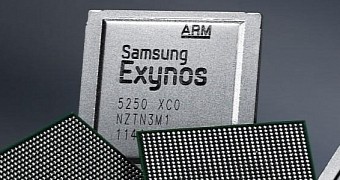Samsung showed us that its in-house chipsets are pretty reputable when it decided to base all its Galaxy S6 line on the Exynos 7420 platform. Well, currently, the Korean tech giant is working on a successor which will probably be implemented in the upcoming Galaxy S7 flagship.
But according to word on the street, the device maker is also working to produce a new chipset aimed at the budget-friendly market. The news comes to us via a G for Games report which reveals that the new silicon will be based on ARM’s Ananke cores.
According to the source, the chipset will become available for sampling next year and will possibly make it into devices towards the middle of 2016. Sometime ago, a leaked roadmap revealed that ARM was planning to unveil a total of five CPU cores covering all market ranges in the upcoming months.
All their names are inspired from Greek mythology. One of them in particular is of interest here, the one that will replace part of the A53 and 32-bit A17 segment and is known as “Ananke.” The Ananke core has been designed for the entry to mid-range market and is based on the big.LITTLE architecture.
Samsung's upcoming chip will be based on a 10nm process
Apart from that, the latest rumor indicates that Samsung’s upcoming SoC will come equipped with Ananke cores build on the 10nm process. This means that, in theory, the chipset should have lower energy requirements (compared to A53 cores) and be able to deliver increased performance.
The same source reveals some information related to ARM and how the company is already planning a successor for the unreleased Ananke, which is codenamed Aura. The core should be ready for release sometime in 2017.
Samsung is seemingly looking to extend its Exynos portfolio in order to cover more territories. It’s likely that we’ll actually end up seeing third-party OEMs pick up Exynos chips and implement them in their own devices in the near future.
And by catering to the low-end, middle-end and high-end markets, Samsung has more chances of selling chips and becoming a bigger presence in the industry.

 14 DAY TRIAL //
14 DAY TRIAL //